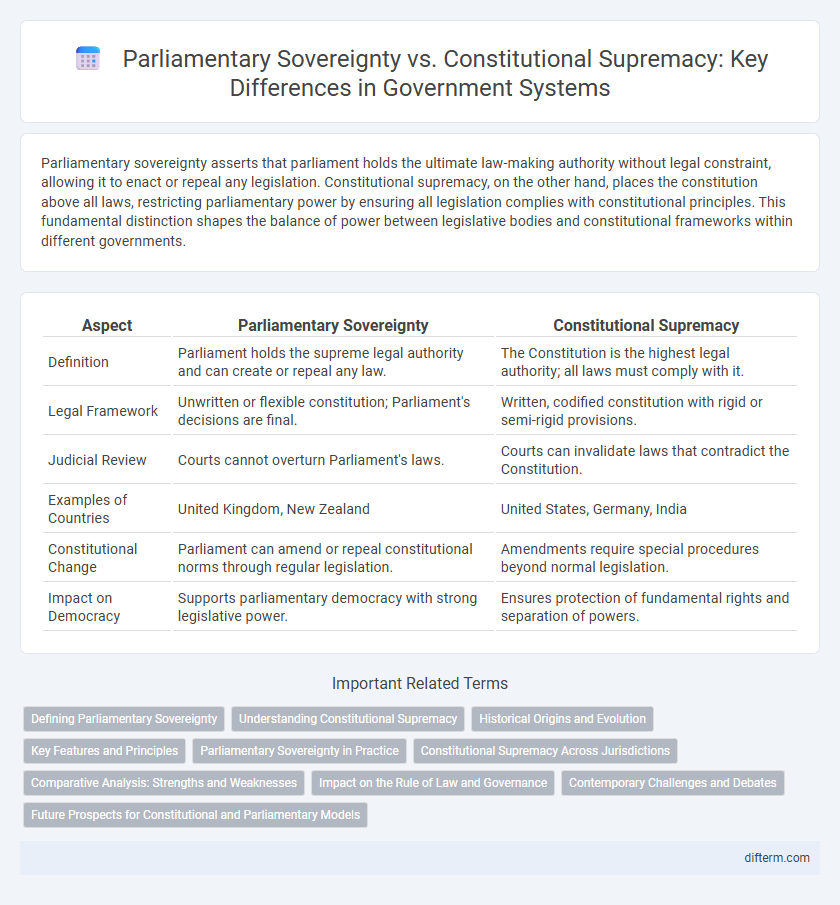Parliamentary sovereignty asserts that parliament holds the ultimate law-making authority without legal constraint, allowing it to enact or repeal any legislation. Constitutional supremacy, on the other hand, places the constitution above all laws, restricting parliamentary power by ensuring all legislation complies with constitutional principles. This fundamental distinction shapes the balance of power between legislative bodies and constitutional frameworks within different governments.
Table of Comparison
| Aspect | Parliamentary Sovereignty | Constitutional Supremacy |
|---|---|---|
| Definition | Parliament holds the supreme legal authority and can create or repeal any law. | The Constitution is the highest legal authority; all laws must comply with it. |
| Legal Framework | Unwritten or flexible constitution; Parliament's decisions are final. | Written, codified constitution with rigid or semi-rigid provisions. |
| Judicial Review | Courts cannot overturn Parliament's laws. | Courts can invalidate laws that contradict the Constitution. |
| Examples of Countries | United Kingdom, New Zealand | United States, Germany, India |
| Constitutional Change | Parliament can amend or repeal constitutional norms through regular legislation. | Amendments require special procedures beyond normal legislation. |
| Impact on Democracy | Supports parliamentary democracy with strong legislative power. | Ensures protection of fundamental rights and separation of powers. |
Defining Parliamentary Sovereignty
Parliamentary sovereignty refers to the principle that the legislative body holds supreme authority to make or repeal any law without being subject to judicial review. This concept establishes that no parliament can bind future parliaments or be constrained by previous statutes, granting it ultimate legal power within a jurisdiction. The doctrine contrasts with constitutional supremacy, where a written constitution limits legislative powers and courts can invalidate laws conflicting with constitutional provisions.
Understanding Constitutional Supremacy
Constitutional supremacy establishes the constitution as the highest legal authority, ensuring all laws and government actions conform to its principles and provisions. This doctrine empowers constitutional courts to invalidate legislation that contradicts the constitution, safeguarding fundamental rights and maintaining the rule of law. Unlike parliamentary sovereignty, constitutional supremacy limits legislative power, reinforcing a system of checks and balances within the government framework.
Historical Origins and Evolution
Parliamentary sovereignty, rooted in the English constitutional framework of the 17th century, emerged from the English Civil War and the Glorious Revolution, establishing that Parliament holds the ultimate law-making authority. Constitutional supremacy developed later, notably in countries like the United States after 1787, where a written constitution became the supreme law, limiting legislative power and asserting judicial review. This evolution reflects a shift from the absolute legislative dominance of parliamentary sovereignty to a balanced legal system where constitutional norms prevail.
Key Features and Principles
Parliamentary sovereignty asserts that the legislature holds ultimate legal authority, enabling it to create, amend, or repeal any law without judicial interference. Constitutional supremacy means the constitution is the highest legal authority, and all laws and government actions must conform to it; courts have the power to invalidate legislation conflicting with the constitution. Key principles include the unchallengeable status of parliamentary laws in parliamentary sovereignty, contrasted with constitutional supremacy's emphasis on judicial review and adherence to fundamental constitutional provisions.
Parliamentary Sovereignty in Practice
Parliamentary sovereignty in practice means that the legislature holds supreme legal authority, capable of enacting or repealing any law without judicial constraint. In systems like the United Kingdom, courts cannot invalidate parliamentary statutes, emphasizing the primacy of elected lawmakers over constitutional provisions. This principle ensures that no parliament can pass laws binding future parliaments, maintaining legislative flexibility within the sovereign framework.
Constitutional Supremacy Across Jurisdictions
Constitutional supremacy establishes the constitution as the highest legal authority, ensuring that all laws and government actions conform to constitutional principles across various jurisdictions. In countries like the United States and Germany, constitutional courts possess the power to invalidate legislation that violates constitutional norms, reinforcing the binding nature of the constitution. This contrasts with parliamentary sovereignty systems, such as the United Kingdom, where statutes passed by parliament cannot be overturned by judicial review on constitutional grounds.
Comparative Analysis: Strengths and Weaknesses
Parliamentary sovereignty grants the legislature supreme authority to make or repeal any law, ensuring flexibility and responsiveness in governance but risking unchecked majority power and potential human rights violations. Constitutional supremacy imposes a higher legal framework that limits legislative actions, guaranteeing protection of fundamental rights and stability but potentially constraining democratic decision-making and adaptability. Comparative analysis reveals that parliamentary sovereignty excels in legislative efficiency, whereas constitutional supremacy prioritizes legal consistency and protection against arbitrary governance.
Impact on the Rule of Law and Governance
Parliamentary sovereignty grants the legislature absolute authority, enabling laws to be enacted or repealed without judicial constraint, which can undermine the rule of law by allowing potential abuses of power. Constitutional supremacy establishes a higher legal framework that limits legislative actions, ensuring laws comply with constitutional principles and reinforcing checks and balances essential for good governance. This constitutional constraint upholds legal certainty, protects individual rights, and promotes accountable government functioning.
Contemporary Challenges and Debates
Parliamentary sovereignty faces contemporary challenges from constitutional supremacy doctrines that prioritize codified constitutional rights over legislative acts, creating legal tensions in jurisdictions like the UK and Canada. Debates center on balancing democratic legitimacy with judicial oversight, as courts increasingly assert power to invalidate parliamentary statutes conflicting with constitutional principles. This dynamic raises questions about the evolving nature of sovereignty in modern governance, highlighting conflicts between parliamentary authority and constitutional frameworks designed to protect fundamental rights.
Future Prospects for Constitutional and Parliamentary Models
Parliamentary sovereignty ensures that Parliament remains the ultimate legislative authority, but future prospects indicate potential shifts towards constitutional supremacy as countries increasingly adopt written constitutions to limit legislative power and protect fundamental rights. Emerging constitutional models emphasize judicial review and entrenched rights, fostering a balance between legislative authority and constitutional constraints. The evolving dynamic reflects a global trend towards integrating constitutional frameworks that provide clearer limitations on parliamentary action, enhancing legal certainty and democratic governance.
Parliamentary Sovereignty vs Constitutional Supremacy Infographic

 difterm.com
difterm.com